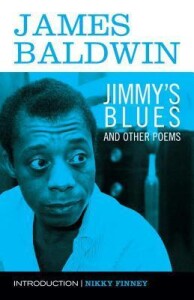
I’d read fiction and nonfiction by Baldwin but not his poetry, so I welcomed this chance to delve into it. This collection actually includes some of his later poems as well as the ones from the original Jimmy’s Blues.
Some of the poems have the fire that I expected, the anger held in check that powers his stories. In his long poem “Staggerlee wonders”, he doesn’t pull his punches, as in this timely excerpt.
Surely, they cannot be deluded
as to imagine that their crimes
are original?There is nothing in the least original
about the fiery tongs to the eyeballs,
the sex torn from the socket,
the infant ripped from the womb,
the brains dashed out against rock,
nothing original about Judas,
or Peter, or you or me: nothing:
we are liars and cowards all,
or nearly all, or nearly all the time:
for we also ride the lightning,
answer the thunder, penetrate whirlwinds,
curl up on the floor of the sun,
and pick our teeth with thunderbolts.Then, perhaps they imagine
that their crimes are not crimes?
Some are witty and sharp like “Guilt, Desire and Love” where he personifies the three as a nighttime encounter on a street corner that ends up causing “a mighty traffic problem”. Others prompt philosophical musings about time and change and memory, such as these lines from “The Giver”: “The giver is no less adrift / than those who are clamouring for the gift.”
His diction can move from high-brow to street slang and back without missing a beat. Many of the poems use repetition and rhythm to summon energy that drives the poems forward, some so jazz-infused they almost seem like scat singing.
Others speak of love, sometimes with humor, sometimes with pain, but also with tenderness, as in these lines from “Song For The Shepherd Boy”:
Hey. The rags of my life are few.
Abandoned priceless gems are scattered
here and there
I don’t know where—
never expected to have them,
much less need them,
but, now, an ache, like the beginning
of the rain,
makes me wonder where they are.If I knew, I would go there,
traveling far and far
and find them
to give them to you.
His generous line breaks lend weight to even the simplest words, making us pause and recognise their significance. While almost never using a formal rhyme scheme, Baldwin deploys rhyme to spice up a subtle passage or to playfully undercut a solemn theme.
There’s outrage here, and bitter anger. There’s existential despair and heartbreak. But there’s also a recognition of what keeps a people going, as in this last stanza of “Munich, Winter 1973”:
Just as the birds above our heads
circling
are singing,
knowing
that, in what lies before them,
the always unknown passage,
wind, water, air,
the failing light
the failing night
the blinding sun
they must get the journey done.
Listen.
They have wings and voices
are making choices
are using what they have.
They are aware
that, on long journeys,
each bears the other,
whirring,
stirring
love occurring
in the middle of the terrifying air.
Have you read any of Baldwin’s work recently?

I love James Baldwin. Jimmy’s Blues poetry book. Read his novels and his auto Biography brilliant
,Leonie